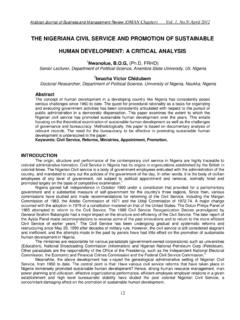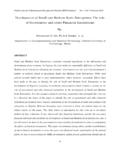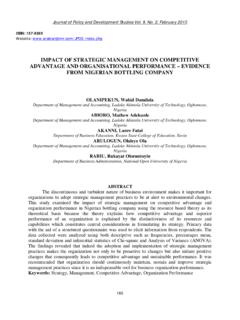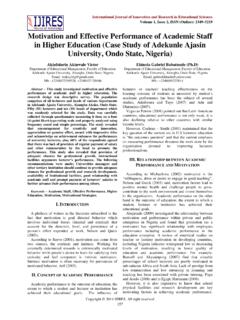Transcription of THE IMPACT OF REMUNERATION ON EMPLOYEES' …
1 Arabian Journal of Business and Management Review (Nigerian Chapter) 7, 2014, No. 2 Vol. 34 THE IMPACT OF REMUNERATION ON EMPLOYEES' PERFORMANCE (A STUDY OF ABDUL GUSAU POLYTECHNIC, TALATA-MAFARA AND STATE COLLEGE OF EDUCATION MARU, ZAMFARA STATE) Ojeleye Yinka Calvin Department of Business Administration, National Open University of Nigeria Abstract The study explore the IMPACT of REMUNERATION on employees' performance. Eighty three employees of Abdul Gusau polytechnic and state college of education both in Zamfara state were handed structured questionnaire to solicit data on REMUNERATION and performance. The dependent variable is employees' performance while the independent variable is REMUNERATION (salary/wages, bonus/incentives).Pearson correlation and multiple regression model were used to analysed the data using SPSS and E-views The finding suggested that the is a strong and positive relationship between REMUNERATION and employees' performance and that salary/wage and bonus/incentives also serve as a form of motivation to the employees.
2 The study recommends Prompt payment of salaries , wages and all entitlements and encouragement of employees' participation in pay determination. Keywords: REMUNERATION , Employees' Performance, Salary, Wage, Bonus, Incentive 1. INTRODUCTION In any organization tasks are performed with the help of resources; material, machine, money and most importantly men. All other resources except for human beings as employees are non-living. Employees make use of these resources to generate output without them other resources will be useless, dormant and will not produce anything. Therefore, human resource is the greatest asset any organization can have and should be given the highest priority. (Ojeleye & Okoro, 2016). Similar view is supported by Zaman (2011), he argued that human resource provides basis for an organization to achieve sustainable competitive advantage. Since organizations are operating in a dynamic and competitive business environment, they need to develop strategies to acquire and retain the competent workforce.
3 He also emphasize, nowadays human asset considered to be the most important asset of any organization and in order to get the efficient and effective result from human resource motivation is necessary REMUNERATION is traditionally seen as the total income of an individual and may comprise a range of separate payments determined according to different rules. For example, the total REMUNERATION of medical staff may comprise a capitation fee and a fee for services, or it may include a salary and shared financial risk (Buchan, Thompson & O'May, 2000). Organizations need highly performing individuals in order to meet their goals, to deliver the products and services they specialized in, and finally to achieve competitive advantage. Performance is also important for the individual. Accomplishing tasks and performing at a high level can be a source of satisfaction, with feelings of mastery and pride. Low performance and not achieving the goals might be experienced as dissatisfying or even as a personal failure.
4 Moreover, performance if it is recognized by others within the organization Arabian Journal of Business and Management Review (Nigerian Chapter) , 201724, No. Vol. 35 is often rewarded by financial and other benefits. Performance is a major although not the only prerequisite for future career development and success in the labor market. Although there might be exceptions, high performers get promoted more easily within an organization and generally have better career opportunities than low performers (VanScotter, Motowidlo, & Cross, 2000) Sonnentag & Frese (2001). These research is aimed at understanding the positive or negative effects of REMUNERATION on employees performance with specific emphasis on two state owned academic institutions in Zamfara state OBJECTIVES 1. To examine the role of salaries , wages, bonus and incentives play as motivational tools in improving employees performance. 2. To determine the relationship between REMUNERATION and employee performance.
5 3. To make suitable recommendations on the important or otherwise of REMUNERATION . The following null hypotheses will be test H01: REMUNERATION does not play any vital role in motivating employees performance H02: There is no significant relationship between REMUNERATION and employees' performance. EMPLOYEES PERFORMANCE Hellriegel, Jackson and Slocum (1999) defined performance as the level of an individual's work achievement after having exerted effort. Job performance can be viewed as an activity in which an individual is able to accomplish the task assigned to him/her successfully, subject to the normal constraints of reasonable utilization of the available resources ( Dar, Akmal, Akram & Khan, 2011) . Motowidlo, Borman, & Schmidt (1997) defined job performance as the overall expected value from employees behaviours carried out over the course of a set period of time. This definition according to Bullock(2013) although fairly technical, includes specific ideas that are worth breaking down: Performance is a property of behavior, or, plainly stated, what people do at work An employee s behavior adds expected value to the organization that is, an employee s behaviors may be distinguished as helping or hindering an organization, but the outcomes of employee behaviors are rarely measured so their value is merely expected Performance can further be broken down into two distinct types: Task Performance and Contextual performance.
6 Task Performance are the actions that contribute to transforming raw materials to goods and services, the things that are typically included in job descriptions. Examples include selling clothes, drilling holes, or teaching a class. Contextual performance are the behaviors that contribute to overall effectiveness through supporting the social and psychological climate of the workplace. Examples include cooperating with teammates, diffusing conflicts, and cleaning up the conference room (Borman & Motowidlo, 1993) (Bullocks 2013). Three basic assumptions are associated with the differentiation between task and contextual performance (Borman & Motowidlo, (1997); Motowidlo & Schmit, 1999), : (1) Activities relevant for task performance vary between jobs whereas contextual performance activities are relatively similar across jobs; (2) task performance is related to ability, whereas contextual performance is related to personality and motivation; (3) task performance is more prescribed and constitutes in-role behavior, whereas contextual performance is more discretionary and extra-role (Sonnentag & Frese, 2001).
7 Measurement of employee Arabian Journal of Business and Management Review (Nigerian Chapter) , 201724, No. Vol. 36 performance is an activity that is very important because it can be used as a measure of success in supporting the success of the organization s employees (Said, 2008). REMUNERATION Maicibi (2005) defined REMUNERATION as pay or reward given to individuals for work done. He further identified the indicators of REMUNERATION include: basic salary, wages, health schemes, pension schemes, transport allowances overtime allowances and responsibility allowances. REMUNERATION can also be referred to as monetary or financial benefits in form of salaries , wages, bonuses, incentives, allowances and benefits that is accrued or given to an employee or group of employees by the employer (firm) as a result services rendered by the employee(s),commitment to the organization or reward for employment.
8 salaries AND WAGES Different definitions have been advanced on salaries and wages usually to show the differences that exist between both terms. Braton & Gold, (2003) basic salary is a fixed periodical payment for non-manual employees usually expressed in annual terms, paid per month with generally no additions for productivity. Wage refers to payment to manual workers, always calculated on hourly or piece rates. Surbhi (2015) also defined salary as a fixed amount paid to the employees at regular intervals for their performance and productivity whereas wages are the hourly- based payment given to the labor for the amount of work finished in a day. He further argued that while Salaried persons are generally said to be doing white collar office jobs which implies that an individual is well educated, skilled and is employed with some firm and holds a good position in the society, whereas the waged person are said to be doing blue collar labour job which implies that an individual is engaged in the unskilled or semi-skilled job and is drawing wages on a daily basis.
9 One purpose of a person as an employee of a company is to earn income in the form of wages or compensation. Received wages to meet basic needs such as food, clothing and housing. Every company in determining the amount of wages paid to the employee must be feasible, so that the lowest wage that is given to meet the needs of their life (Kanzunnudin, 2007). Agburu (2012) argued for the importance of salaries and wages in Nigeria, he stated that wages should not only be adequate but they must also show some element of equity, this is particularly true from the point of the employees. Anything short of a fair and equitable wage or reward can quickly at tract the wrath of employees in an economy such as Nigeria. For many Nigerian employees, wages or salaries are highly critical issues. They are decisive because without them in sufficient quantities, life becomes extremely precarious for the worker and members of his/her family.
10 As direct financial rewards, wages and salaries are the most emphasized by the employees, thus they sort of take a centre stage in the scheme of things as far as rewards for work is concerned. BONUSES AND INCENTIVES Investopedia (2016) defined bonus as an additional compensation given to an employee above his/her normal wage. A bonus can be used as a reward for achieving specific goals set by the company, or for dedication to the company. Heathfield (2016) bonus pay is compensation over and above the amount of pay specified as a base salary or hourly rate of pay. The base amount of compensation is specified in the employee offer letter, in the employee personnel file, or in a contract. Employers can distribute bonus pay randomly as the company can afford to pay a bonus, or the amount of the bonus pay can be specified by Arabian Journal of Business and Management Review (Nigerian Chapter) , 201724, No. Vol. 37 contract.











